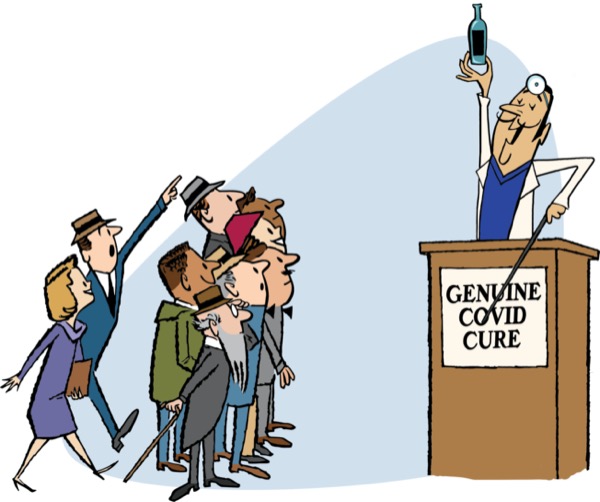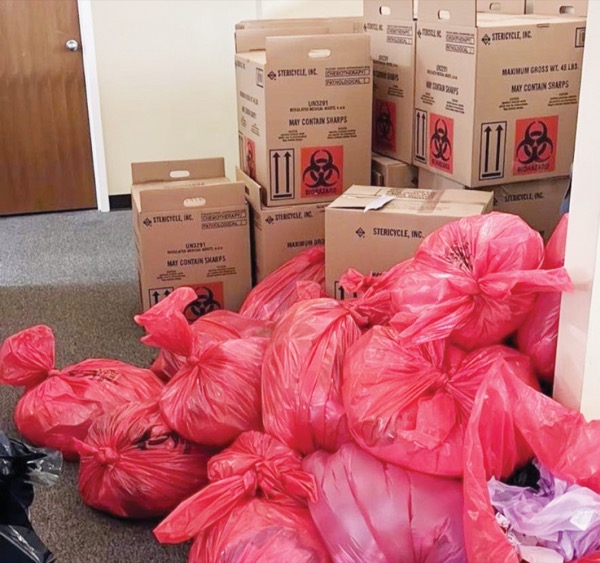While the SARS-CoV-2 pandemic has brought out the best in millions of frontline healthcare workers, it has also prompted the worst to surface with a host of bogus cures and treatments, problematic tests, financial fraud and fake vaccination cards.
Like the flotsam and jetsam that follow in the wake of a shipwreck, hucksters and scammers quickly surface to profit from disasters and tragedies. With snake oil salesmen and fraudsters popping up around the country, the COVID-19 pandemic is turning into another textbook case of how a crisis offers opportunities to reap ill-gotten gains.
Consider the Washington State man who, as early as March 2020, posted online that he had a COVID-19 vaccine when no federally authorized vaccine existed, according to FDA investigators who caught up with him after a sting operation. Johnny T. Stine, 55, of Redmond, Wash., was sentenced in March in federal court after pleading guilty in August 2020 to introducing misbranded drugs into interstate commerce, a misdemeanor. He received five years probation and was ordered to pay $246,986 in restitution. The charges alleged he injected 50 to 100 people with fake COVID-19 vaccines at $400 to $1,000 a pop. To date, authorities have not identified what these people actually received. The case was investigated by the FDA Office of Criminal Investigations, Homeland Security Investigations and the Seattle Police Department.
Then there’s the case brought to light in a March 2021 federal indictment of a Thai national who was charged with allegedly selling chloroquine phosphate as a COVID-19 treatment to people around the world, including in the United States. The defendant allegedly made tens of thousands of dollars from his scheme in which shipments were disguised as fish tank accessories, the government said. Chloroquine phosphate may do a good job cleaning your fish tank, but it is not indicated by the FDA as a treatment for COVID-19.
Ramping Up Efforts
Federal law enforcement officials tasked with combatting fraud ramped up their efforts in February 2020 as the COVID-19 outbreak emerged, said Matthew T. Charette, a special agent in charge with the Office of Inspector General at Health and Human Services, who has 20 years of experience protecting the integrity of the Medicare and Medicaid programs—favorite targets of medical fraudsters. Recognizing there would soon be increased funding from Congress to address the outbreak, the investigators knew that where federal funding goes, scammers follow, Mr. Charette told Infectious Disease Special Edition.
The Health Care Fraud Unit’s COVID-19 Interagency Working Group, which was formed to find these lawbreakers, got to work. In May 2021, the U.S. Department of Justice (DOJ) announced criminal charges against 28 telemedicine company executives, physicians, marketers and medical business owners for alleging engaging in various healthcare fraud schemes designed to exploit the COVID-19 pandemic, which according to the indictment, netted more than $143 million.
The indictment is a good example of how COVID-19 fraud pans out, he explained. Multiple defendants were charged with allegedly offering COVID-19 tests to Medicare beneficiaries at senior living facilities, drive-through COVID-19 testing sites and medical offices. The fraud allegedly involved inducing the beneficiaries to give up their personal data and a saliva or blood sample. The defendants then allegedly misused the personal information and samples to submit claims to Medicare for unrelated, medically unnecessary, and more costly tests. In addition, “the COVID-19 test results were not provided to the beneficiaries in a timely fashion or were not reliable, risking the further spread of the disease,” the indictment said.
To increase access to care during the COVID-19 pandemic, following the January 2020 declaration of a public health emergency, the Centers for Medicare and Medicaid Services (CMS) in March 2020 expanded telehealth regulations that enable beneficiaries to receive a wider range of services from their doctors without having to travel to a medical facility—a crucial step with stay at home orders taking effect.
In what authorities called a first in the nation, the COVID-19 Health Care Fraud Takedown resulted in defendants being charged with allegedly exploiting the liberalized rules “by submitting false and fraudulent claims to Medicare for sham telemedicine encounters that did not occur.” Medical professionals allegedly offered and paid bribes in exchange for referring unneeded testing, the indictment charged.
The May indictment was followed by a September indictment in which nine more defendants were charged with submitting more than $29 million in false billings regarding alleged fraud related to COVID-19 claims. Defendants are alleged to have used the expanded telehealth regulations to misuse patient information to submit claims to Medicare “for unrelated, medically unnecessary and expensive laboratory tests,” the indictment charged.
As COVID-19 spread, the president of a California medical technology company was charged with conspiracy to commit health care fraud by allegedly “exploiting the pandemic by fraudulently promoting an unproven COVID-19 test to the market,” said Assistant Attorney General Brian A. Benczkowski of the Justice Department’s Criminal Division.
“The allure of cheap reliable alternatives to today’s standard blood tests panels has captured the imagination of the health care industry, making such alternatives a prime subject for fraudsters,” said U.S. Attorney David L. Anderson of the Northern District of California, in a statement. “The scheme described in the complaint, in which the defendant allegedly leveraged this allure by appending the fear of the COVID-19 pandemic, amounts to a cynical multimillion dollar hoax.”
Then there’s the Center for Covid Control, an Illinois company that was offering “free COVID-19 testing for all patients” at its approximately 300 sites across the country, according to its website. They then announced that since “CCC remains committed to providing the highest level of customer service and diagnostic quality” operations were suspended starting in mid-January, “to train additional staff on sample collection and handling, customer service and communications best practices, as well as compliance with regulatory guidelines.”
The company decided training was needed after a number of states and CMS announced investigations.
In one of the investigations, the company, which was founded by a 29-year-old woman whose Linked-In site says her previous experience included opening an axe-throwing lounge, was sued by Washington State Attorney General Bob Ferguson for allegedly “providing invalid, false and delayed COVID-19 test results to Washingtonians, or sometimes providing no results at all,” his office said in a statement.
“The company’s unlawful practices included storing tests in garbage bags for over a week rather than properly refrigerating them, and backdating sample collection dates so that stale samples would still be processed,” the AG claimed in the indictment.
“Center for COVID Control contributed to the spread of COVID-19 when it provided false-negative results,” Mr. Ferguson said. “These sham testing centers threatened the health and safety of our communities. They must be held accountable.” The suit claims the company, which operated 13 sites in Washington, allegedly billed the federal government for $124 million for tests for uninsured residents in his state. The site now says it is closed indefinitely.
“We take seriously any allegations of fraud or misbehavior by COVID-19 testing sites. CMS’s Center for Clinical Standards and Quality investigates these kinds of complaints and is aware of several alleged instances of misconduct by this company’s labs. We know that people want to feel confident that the testing sites they visit are reputable and the results they receive are accurate,” Lee Fleisher, MD, the chief medical officer and director of the Center for Clinical Standards and Quality at CMS, told Infectious Disease Special Edition.
Dr. Fleisher added, “CMS is actively investigating numerous complaints about multiple laboratories and testing sites. CMS continues its investigations and will take compliance and enforcement actions as appropriate.”
However, CMS said it has “no further information about any complaints received or investigated by the state agency or the CMS Location offices for these laboratories. Until a complaint has been received, a survey has been completed, and the laboratory has the opportunity to respond to any findings, there are no reports to release.” CMS also said it cannot comment on the nature of complaints received to safeguard the anonymity of complainants.
Along with problems with tests, questionable cures also popped up. The FDA has been kept busy sending warning letters to such companies as natural health and herbal medicine purveyors from Florida to California telling them their products are not approved to treat COVID-19 and their claims on their websites were misleading.
The Federal Trade Commission in 2021 sued a nasal spray manufacturer, alleging it falsely promoted its saline nasal sprays as an effective way to prevent and treat COVID-19. The FTC alleged that without conducting any clinical trials to support its COVID-19 related claims, the company sold its products on a large web retailer, as well as well-known brick-and-mortar shops. The products’ COVID-19 properties are no longer promoted on the company’s website, but it is still marketed as a nasal spray.
“Companies can’t make unsupported health claims, no matter what form a product takes or what it supposedly prevents or treats,” said Samuel Levine, the director of the FTC’s Bureau of Consumer Protection. “That’s the lesson of this case and many others like it, and it’s why people should continue to rely on medical professionals over ads.”
The U.S. Department of Justice, the agency spearheading the effort to combat fraud, said it has brought actions against dozens of other defendants for allegedly selling products, such as industrial bleach, ozone gas, vitamin supplements and colloidal silver ointments, with false or unapproved claims about their ability to prevent or treat COVID-19 infections.
With all the controversy over COVID-19 vaccination, especially in places that would not allow an unvaccinated person to attend public venues or eat in local restaurants, fake vaccine cards were bound to surface—and they did with abundance.
The epidemic of fake vaccine verification cards isn’t as ubiquitous as the COVID-19 pandemic, but it is widespread. Incidents of people manufacturing the fake cards and using them to get into events litter the internet. These are not just random acts by people seeking a fast buck. How to forge a fake vax card is appearing on conspiracy and anti-vaccination websites and blog posts in an apparent concerted effort to undermine the vaccination campaign. It is a federal offense to misuse an authorized government seal—specifically, the CDC emblem that appears on authentic cards.
Although it is impossible to put a price tag on the total cost of COVID-19 fraud to both individuals and the government, the DOJ reported that as of March 2021, the amount that schemes had attempted to obtain from the government had already reached $569 million. By September, that number grew exponentially. In just one indictment, the DOJ said the money allegedly lost as of a result of the activities by the 136 defendants discussed earlier was $1.4 billion. For the fiscal year ending September 30, 2021, the DOJ reported the amount it had obtained from settlements for all medical fraud—not just COVID-19—involving the government was $5 billion.
The sources reported no relevant financial disclosures.
This article is from the March 2022 print issue.



